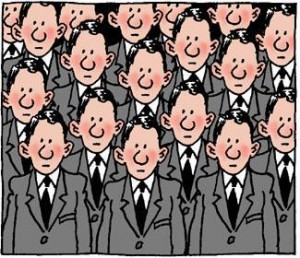In my last post, I discussed why the term “inequality aversion” is a rather inelegant way to express certain human motivations. A desire to not be personally disadvantaged is not the same thing as a desire for equity, more generally. Further, people readily tolerate and create inequality when it’s advantageous for them to do so, and such behavior is readily understandable from an evolutionary perspective. What isn’t as easily understandable – at least not as immediately – is why equality should matter at all. Most research on the subject of equality would appear to just take it for granted (more-or-less) that equality matters without making a concerted attempt to understand why that should be the case. This paper isn’t much different.
The paper by Raihani & McAuliffe (2012) sought to disentangle two possible competing motives when it comes to punishing behavior: inequality and reciprocity. The authors note that previous research examining punishment often confounds these two possible motives. For instance, let’s say you’re playing a standard prisoner’s dilemma game: you have a choice to either cooperate or defect, and let’s further say that you opt for cooperation. If your opponent defects, not only do you lose out on the money you would have made had he cooperated, but your opponent also ends up with more money than you do overall. If you decided to punish the defector, the question arises of whether that punishment is driven by the loss of money, the aversion to the disadvantageous inequality, or some combination of the two.
To separate the two motives out, Raihani & McAuliffe (2012) used a taking game. Subjects would play the role of either player 1 or player 2 in one of three condition. In all conditions, player 1 was given an initial endowment of seventy cents; player 2, on the other hand, started out with either ten cents, thirty cents, or seventy cents. In all conditions, player 2 was then given the option of taking twenty cents from player 1, and following that decision player 1 was then given an option of playing ten cents to reduce player 2′s payoff by thirty cents. The significance of these conditions is that, in the first two, if player 2 takes the twenty cents, no disadvantageous inequality is created for player 1. However, in the last condition, by taking the twenty cents, player 2 creates that inequality. While the overall loss of money across conditions is identical, the context of that loss in terms of equality is not. The question, then, is how often player 1 would punish player 2.
In the first two conditions, where no disadvantageous inequality was created for player 1, player 1 didn’t punish significantly more whether player 2 had taken money or not (approximately 13%). In the third treatment, where player 2′s taking did create that kind of inequality, player 1 was now far more likely to pay to punish (approximately 40%). So this is a pretty neat result, and it mirrors past work that came at the question from the opposite angle (Xiao & Houser, 2010; see here). The real question, though, concerns how we are to interpret this finding. These results, in and of themselves, don’t tell us a whole lot about why equality matters when it comes to punishment decisions.
They also doesn’t tell me much about this terrible itch I’ve been experiencing lately, but that’s a post for another day.
I think it’s worth noting that the study still does, despite it’s best efforts, confound losing money and generating inequality; in no condition can player 2 create disadvantageous inequality for player 1 without taking money away as well. Accordingly, I can’t bring myself to agree with the authors, who conclude:
Together, these results suggest that disadvantageous inequality is the driving force motivating punishment, implying that the proximate motives underpinning human punishment might therefore stem from inequality aversion rather than the desire to reciprocate losses.
It could still well be the case that player one would rather not have twenty cents taken from them, thank you very much, but don’t reciprocate with punishment for other reasons. To use a more real-life context, let’s say you have a guest come to your house. At some point after that guest has left, you discover that he apparently also left with some of the cash you had been saving to buy whatever expensive thing you had your eye on at the time. When it came to deciding whether or not you desired to see that person punished for what they did, precisely how well off they were relative to you might not be your first concern. The theft would not, I imagine, automatically become OK in the event that the guy only took your money because you were richer than he was. A psychology that was designed to function in such a manner would leave one wide-open for exploitation by selfish others.
However, how well off you were, relative to how needy the person in question was, might have a larger effect in the minds of other third party condemners. The sentiment behind the tale of Robin Hood serves as an example towards that end: stealing from the rich is less likely to be condemned by others than stealing from one of lower standing. If other third parties are less likely, for whatever reason, to support your decision to punish another individual in contexts where you’re advantaged over the person being punished, punishment immediately risks becoming more costly. At that point. it might be less costly to tolerate the theft rather than risking condemnation by others for taking action against it.
What might be better referred to as, “The Metallica V. Napster Principle”.
One final issue I have with the paper is a semantic one: the authors label the act of player 2 taking money as cheating, which doesn’t fit my preferred definition (or, frankly, any definition of cheating I’ve ever seen). I favor the Tooby and Cosmides definition where a cheater is defined as “…an individual who accepts a benefit without satisfying the requirements that provision of that benefit was made contingent upon.” As there was no condition required for player 2 to be allowed to take money from player 1, it could hardly be considered an act of cheating. This seemingly minor issue, however, might actually hold some real significance, in the Freudian sense of the word.
To me, that choice of phrasing implies that the authors realize that, as I previously suggested, player 1s would really prefer if player 2s didn’t take any money from them; after all, why would they? More money is better than less. This highlights, for me, the very real and very likely possibility that what player 1s were actually punishing was having money taken from them, rather than the inequality, but they were only willing to punish in force when that punishment could more successfully be justified to others.
References: Raihani NJ, & McAuliffe K (2012). Human punishment is motivated by inequity aversion, not a desire for reciprocity. Biology letters PMID: 22809719
Xiao, E., & Houser, D. (2010). When equality trumps reciprocity Journal of Economic Psychology, 31, 456-470 DOI: 10.1016/j.joep.2010.02.001




